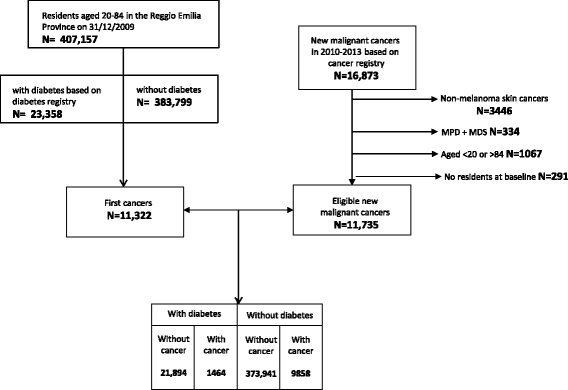Diabetes and risk of cancer incidence: results from a population-based cohort study in northern Italy
- PMID: 29070034
- PMCID: PMC5657107
- DOI: 10.1186/s12885-017-3696-4
Diabetes and risk of cancer incidence: results from a population-based cohort study in northern Italy
Abstract
Background: Aim of this study was to compare cancer incidence in populations with and without diabetes by cancer site. Furthermore, we aimed at comparing excess risk of cancer according to diabetes type, diabetes duration and treatment, the latter as regards Type 2 diabetes.
Methods: By use of the Reggio Emilia diabetes registry we classified the resident population aged 20-84 at December 31st 2009 into two groups: with and without diabetes. By linking with the cancer registry we calculated the 2010-2013 cancer incidence in both groups. The incidence rate ratios (IRR) by cancer site, type of diabetes, diabetes duration, and as concerns Type 2 diabetes, by treatment regimen were computed using Poisson regression model and non-diabetic group as reference.
Results: The cohort included 383,799 subjects without diabetes and 23,358 with diabetes. During follow-up, we identified 1464 cancer cases in subjects with diabetes and 9858 in the remaining population. Overall cancer incidence was higher in subjects with diabetes than in those without diabetes (IRR = 1.22, 95%CI 1.15-1.29), with similar results focusing on subjects with at least 2-year diabetes duration. Cancer sites driving overall increased risk were liver, pancreas, Colon rectum, and bladder in both sexes, corpus uteri for females. There was also suggestion of an increased risk for kidney cancer in females and a decreased risk for prostate cancer. Excess risk was found in patients with Type 2 diabetes, more marked among insulin users, especially with combined therapy. We observed an increasing risk for diabetes duration up to 10 years from diagnosis (IRR = 1.44, 95%CI 1.29-1.61) and a subsequent decrease to moderate-higher risk (IRR = 1.15, 95%CI 1.04-1.30).
Conclusions: Our study indicates that the strength of association depends on specific cancer site. Insulin, monotherapy or combined therapy, per se or as an indication of poor blood glucose control, in addition to diabetes duration, may play a role in the association of diabetes and cancer.
Keywords: Cancer incidence; Cancer registry; Diabetes mellitus; Diabetes registry; Diabetes treatment; Insulin; Oral hypoglycaemic agents.
Conflict of interest statement
Ethics approval and consent to participate
This study was approved by the Provincial Ethical Committee in July 2014 (n. 2014/0019727). In accordance to Ethics Committee, we could access sensitive data related to the disease under study for registration activities, regardless of any consent provided. Consent is deemed unnecessary in accordance with Italian regulations for population based disease registries.
Consent for publication
Not applicable. This study introduces only aggregated data. Person identification from information reported is not possible. According to 2012 Privacy Authority Act, Ethics Committee explicitly validated our research with no need do patient informed consent.
Competing interests
The authors declare that they have no competing interests.
Publisher’s Note
Springer Nature remains neutral with regard to jurisdictional claims in published maps and institutional affiliations.
Figures
References
MeSH terms
LinkOut - more resources
Full Text Sources
Other Literature Sources
Medical


